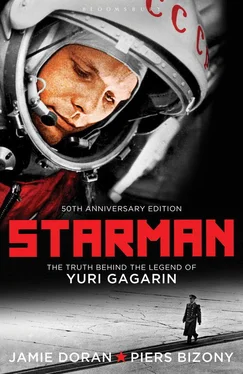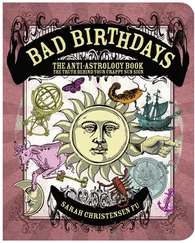Almost immediately Gagarin’s status was affected. His foreign trips were curtailed and his lines of communication with the Kremlin severed. Brezhnev did not care to be reminded of his predecessor’s space triumphs. Burlatsky, who knew Gagarin very well, noticed an immediate change in the young cosmonaut’s mood. ‘I’m sure that he became unhappy. It wasn’t because he disliked Brezhnev. No, quite the opposite, it was because Brezhnev regarded him as a representative around the world for Khrushchev. Immediately Gagarin lost his status, his position. I had the feeling he didn’t know what to do with himself. Politically he represented the hand of peace extended from the Soviet Union to the West, but Brezhnev started up the arms race again, and he didn’t need people like Gagarin.’ Burlatsky stresses the perpetual truism of political life in Russia. ‘It’s not so important who’s who, but who belongs to whom. Gagarin belonged to Khrushchev, and that was enough to finish his career in Brezhnev’s time.’
Burlatsky is not alone in his opinion that the new hard-line regime ‘affected Gagarin’s life in such a way that he lost everything, and he had to try and find himself again in some kind of new experience. Drink, perhaps. He was devastated. One day he was a representative of his country, and the next, a simple pilot without any position. Somebody once wrote, “The greatest unhappiness is to have known happiness before.” Brezhnev and his Politburo friends took that happiness away, and they were guilty of everything that happened to Gagarin afterwards.’
Gagarin’s personal driver Fyodor Dyemchuk sums up the political fall-out for the First Cosmonaut in the most straightforward way. He remembers that in the Khrushchev days Gagarin’s frequent trips to the Kremlin were happy affairs, often accompanied by laughter and drink. In Brezhnev’s time the trips became far less frequent, ‘and Gagarin would come out looking sad and sit quietly in the car. I wouldn’t ask him what was wrong. I didn’t need to. I could see he was busy with his thoughts.’
Gagarin’s greatest initial shock was that he was no longer able to work behind the scenes on behalf of the many people who came to him with pleas for help. He was hardly a saint, but he was without doubt an essentially good-natured man, a product of his decent upbringing in Gzhatsk and Klushino. The virtues of social and personal responsibility that he had learned during the war years stayed with him throughout his life. Among those former colleagues who hint today at Gagarin’s moments of caprice, his occasional misbehaviour and thoughtlessness, none of them denies his warm and generous behaviour towards friends and strangers alike when they were in trouble. In fact, by 1964 all the cosmonauts who had completed missions were well known, and their influence stretched a long way in higher quarters.
At Star City a special Correspondence Department was established ten days after Gagarin’s flight to deal with the immense quantities of mail coming in from all over the Union, and many foreign countries besides. Over time the department was expanded to deal with other cosmonauts’ correspondence, with seven secretaries on permanent duty (at least two of whom were answerable to the KGB). Sergei Yegupov headed the operation with two principal aims in mind: first, to help Gagarin with his workload; second, to keep an eye on any sensitive matters that might crop up. His duties are more politically relaxed now, and the world’s fascination with cosmonauts has faded, but he still runs the department. ‘Most often the letters were addressed to “Gagarin, Moscow”, or “Gagarin, the Kremlin”. In the end it was decided to give him a special post code, “Moscow 705”. Over the years, I think we must have received at least a million letters.’
Most of the letters – but by no means all of them – expressed joy, wonder, admiration and pride at Gagarin’s achievement. Yegupov does not like to acknowledge that some of these letters must have been ‘difficult’ in some way. ‘We still keep the entire archive at Star City, and everybody can get access to them. You will see, there are no bad letters anywhere in the correspondence.’ It seems reasonable to assume that some of them must have been weeded out, but a great many distressing pleas for help still remain. ‘About ten or fifteen per cent of the correspondence contained various requests from ordinary citizens asking for better housing, the installation of water supply points, an increase in pension payments, and applications for kindergartens – incidentally, that was a pretty complicated issue in those days.’
The most sensitive letters came from prisoners asking for their cases to be reviewed. Fyodor Dyemchuk remembers a particular incident involving a young man harshly sentenced for a first offence. ‘Gagarin said, “What shall I do? I have to help, because if we save this boy it’ll be so much easier and simpler. If he goes to prison he’ll simply be lost for ever into the crime system, and he’ll never make it to become a man.” He went everywhere and visited everybody’s offices. He really pushed, and I think he got some positive results.’
One can only imagine Gagarin’s anxiety when faced with requests like these:
Esteemed Yuri Alexeyevich Gagarin,
A First Class Navigator who served with the Air Force for nineteen years requests you to receive him. The life of my son depends on this…
Yuri Alexeyevich, Hero of the Soviet Union,
My daughter has been refused entry to the university because of my Jewish background. Please can you…
Dear Comrade Gagarin,
Citizen Danilchenko asks you to consider helping to obtain a reservation for his daughter at an invalid’s residential home, since she is mentally unwell…
Yegupov pulls out other typical examples from the archive. ‘Here’s a letter asking for better housing for the Kurdyumov family, nine people living in a single room, sixteen metres square, in an old house with damp running down the walls. Here’s another request for better housing from citizen Morazova, and meanwhile she has a child with an inborn heart deficiency; or this one, where prisoner Yakutin says he was wrongly convicted, and requests the verdict to be cancelled.’ Somehow Gagarin managed to answer almost all the letters, showing great concern, and even folding a particularly heart-breaking example into his wallet as a spur to his conscience. He was, however, entirely unmoved by some of the pleas he received:
Dear Cosmonaut Yuri Gagarin,
Please allow me to congratulate you on your great feat. Please allow me also to ask a great favour on behalf of the distilling firm of Richter & Co., and that is to be so kind as to allow us to use your well-known and respected name for a new product, ‘Astronaut Gagarin Vodka’.
‘Why did you have to show me this?’ he complained to Yegupov. ‘I’ve wasted three minutes on reading it.’ Then he spent a good half-hour phrasing a careful and warm reply to a 15-year-old boy from Canada who had politely written in for career advice.
As often as not, people would actually accost the First Cosmonaut in person with their pleas for help. Alexei Leonov says that whenever Gagarin visited his family in Gzhatsk, he would find various local dignitaries waiting for him in his parents’ house with requests for political favours. ‘He did a lot for his old neighbours and the people of Smolensk. Gzhatsk was originally an old-fashioned merchants’ town, but after 1961 it started to bloom, and it turned into a modern, highly developed city.’ Gagarin’s name and reputation stimulated a drastic change of fortune for the entire region.
But there was one notable occasion when Gagarin refused point-blank to help. A mother wrote to him saying that her son was in trouble for cutting down a fir tree in a forbidden area at Christmas time. Gagarin looked into the business, found out that it had probably been more than one tree and that the young man was selling them off for profit. He recommended the man be sacked from his job. According to his driver, Gagarin became pretty angry and said, ‘What happens if everyone goes and cuts down “just one” fir tree? Where are we going to live then? Any day now, we won’t have anything left.’
Читать дальше












